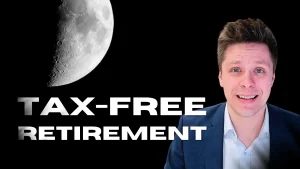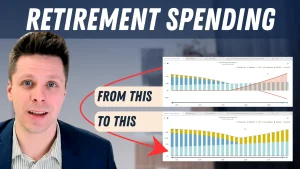[vc_row][vc_column][vc_video link=”https://youtu.be/HKo6FKD4qz0″ css=”.vc_custom_1677120607021{padding-top: 20px !important;padding-bottom: 20px !important;}”][/vc_column][/vc_row][vc_row][vc_column][vc_column_text]Many investors and financial advisors are fond of dividends and base their entire investment strategy on companies that pay dividends.
However, it’s time to take a closer look at the reality of dividends and their impact on investment performance. The truth is, and I might be upsetting the dividend-loving crowd, but dividends do not add extra value to your investments. I’m not saying you shouldn’t invest in companies that pay a dividend; I’m simply saying that the dividend itself adds no extra value.
To start,
What is a dividend?
A dividend is a payment made by a company to its shareholders, usually in the form of cash or additional stock shares on a quarterly basis.
Since payments are somewhat regular, many financial advisors position a dividend strategy like a rental property.
Here’s how they explain it.
The False Rental Property Comparison
Let’s say you have a rental property; as long as you have renters, you’ll continue receiving payment whether the property increases or decreases in value.
When it comes to your investments, if we build you a portfolio of dividend-paying stocks, you’ll consistently receive income “like rent” whether the portfolio increases or decreases in value.
Don’t get me wrong; this sounds very appealing. If the portfolio falls in value, you are still receiving dividend income. If the portfolio rises in value, you benefit from appreciation with additional dividend income.
However, in reality, no additional benefit is created by receiving a dividend, as you are just moving money from your left pocket to your right pocket.
Let me explain.
The Impact of Dividends
When a company pays out a dividend, the value of the company decreases by the amount of the dividend.
For example, Company X has a value of $1,000,000; to simplify, let’s say they have no revenue or assets. The $1,000,000 is held in their bank account.
If company X elects to payout a dividend of 5% or $50,000, its value will drop to $950,000, as that’s what is left in the bank account.
As an owner of a dividend-paying stock, this is where the rental comparison falls apart.
Rental property vs. dividend
Suppose you own 10% or $100,000 of Company X. If you received a 5% dividend, it will be worth $5,000. By receiving the dividend, your share value will decrease to $95,000 and you will receive $5,000 in cash. In the end, you still have $100,000
If you had reinvested the dividend instead of taking it as cash, you would still own $100,000 of Company X shares.
In both cases, you end up with $100,000, and no additional investment return was created by receiving the dividend.
On the other hand, if you have a rental property worth $100,000 and receive $5,000 in rent, it will have no impact on the home’s value, and you’ll be $5,000 ahead with the rent payment. Hence dividends do not equate to rental income.
Our friends over at HonestMath.com do a great job of illustrating this.[/vc_column_text][/vc_column][/vc_row][vc_row][vc_column][dt_fancy_image image_id=”9857″ width=”1000″ css=”.vc_custom_1677121081333{padding-top: 20px !important;padding-bottom: 20px !important;}”][vc_column_text]
Image Source: Honest Math
We have Stock A, which pays a high dividend; stock B, which pays a lower dividend; and Stock C, which has no dividend.
As we just reviewed, dividend payments reduce stock values, so Stock A has less capital appreciation than Stock B, and Stock B has less capital appreciation than Stock C. At the end of the day, dividend or not, all these stocks grow at the same rate.
What about dividends in retirement?
Another reason investors and advisors love dividends is the income they provide. It feels good to get paid by your investments, especially in retirement.
Despite how good it feels to receive a dividend, it will not make you wealthier, and there are more tax-efficient ways to receive income in retirement.
Dividend compared to no dividend
In keeping with our example, if you own $100,000 of Company X shares and receive a $5,000 dividend payment, your shares will now be worth $95,000, and you will have $5,000 in dividend income.
Alternatively, let’s say we have Company Y. It’s the exact same business as Company X, except it doesn’t pay a dividend. If you needed $5,000, you could simply sell $5,000 worth of Company Y shares.
In both scenarios, you end up in the exact same position, dividend or not.
Benefits of a non-registered account
However, if you own both companies in your non-registered account, Company Y would be more tax-efficient as withdrawing capital is taxed at a lesser rate than dividend income.
Additionally, selling shares allows you to withdraw the amount the exact amount you require. If you only need $3,000, you can sell $3,000 worth of shares. Whereas if you only need $3,000 and the dividends paid to you are $5,000, you will be left with a tax bill on money you did not need.
If you own the shares in a registered account such as an RRSP or TFSA, there is no difference, and you’ll be in the exact same position with Company X & Y.
Summary
In conclusion, there’s nothing wrong with investing in companies that pay dividends, however, you have to understand it’s not like owning rental property. The dividend itself does not increase your rate of return because you’re simply taking money from your left pocket and putting it in your right pocket. The next time you hear an advisor tell you about their dividend investment strategy, proceed with caution; this might be a salesperson, not a professional portfolio manager.[/vc_column_text][/vc_column][/vc_row]





